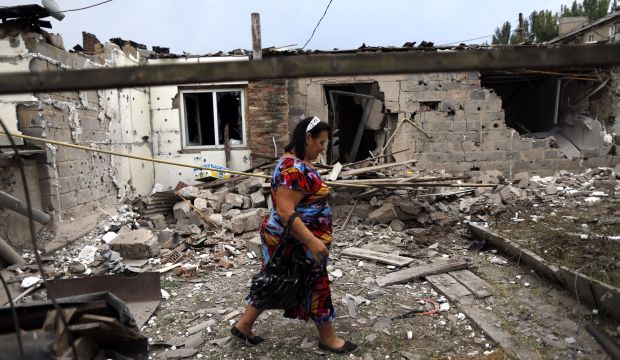
A woman walks past a damaged house in Donetsk on August 11, 2014. Ukrainian troops have been shelling neighborhoods in the city in an attempt to drive out pro-Russian separatists. (AFP Photo/ Max Vetrov)
Moscow, AP—A convoy of 280 Russian trucks headed for eastern Ukraine early Tuesday, one day after agreement was reached on an international humanitarian relief mission.
But the International Committee of the Red Cross (ICRC), which is due to coordinate the operation, said it had no information on what the trucks were carrying or where they were going. That could raise fears in Ukraine and the West, where leaders have voiced concerns that Russia could use the initiative as a pretext for sending troops into rebel-held territory.
Russian television and news agencies reported Tuesday that 2,000 tons of aid was en route to Ukraine, where fighting between pro-Russian separatists and government forces has claimed more than 1,300 lives since April, according to a UN report.
NTV television showed hundreds of white trucks gathered at a depot outside Moscow, and said they were carrying everything from baby food to sleeping bags. A Russian Orthodox Priest sprinkled holy water on the trucks, some of which bore a red cross, before their departure. They could take up to a day to arrive at their destination.
Andre Loersch, a spokesman for the ICRC mission in Ukraine, said that while the organization had reached a general agreement about delivery of humanitarian aid to the region, he had “no information about the content” of the trucks and did not know where they were headed.
“At this stage we have no agreement on this, and it looks like the initiative of the Russian Federation,” he said.
The Ukrainian Foreign Ministry said it was not immediately able to comment on the convoy.
It was unclear whether the trucks would cross the border into the rebel-controlled territory of Luhansk or the government-controlled territory in Kharkiv. At least 60 miles (100 kilometers) of the border is currently in rebel hands.
On Monday, the ICRC issued a statement saying that it was ready to facilitate the aid operation with the involvement of all sides concerned. However, Laurent Corbaz, the ICRC’s head of operations for Europe and Central Asia, said that “practical details of this operation need to be clarified” before the deliveries can move ahead.
Kiev and the West have repeatedly opposed any Russian humanitarian aid mission to east Ukraine, fearing that such a move could preface an intervention by Moscow. Throughout the conflict, Ukraine and the West have accused Russia of aiding the rebels with arms and expertise, a charge that the Kremlin has denied.
After announcing the aid mission on Monday, US President Barack Obama and Ukrainian President Petro Poroshenko agreed that “any Russian intervention in Ukraine without the formal, express consent and authorization would be unacceptable and a violation of international law,” according to a White House statement.
